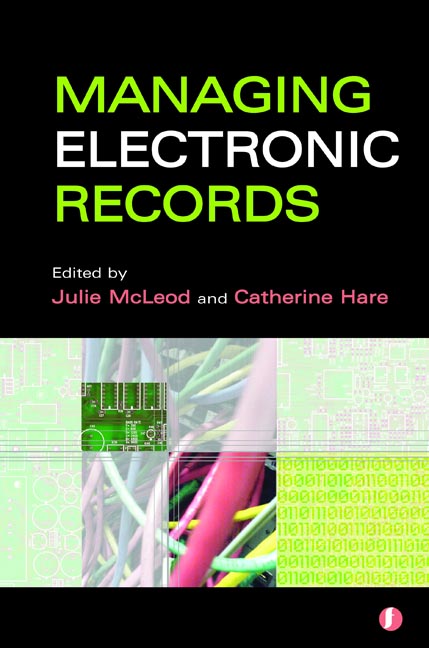Book contents
- Frontmatter
- Contents
- The editors and contributors
- Preface
- 1 The wild frontier ten years on
- 2 The use of standards and models
- 3 Metadata matters
- 4 Digital preservation – ‘the beautiful promise’
- 5 Research in electronic records management
- 6 Technologies for preservation
- 7 Legal issues
- 8 Ethics and electronic recordmaking
- 9 Competencies – the asset that counts most: on developing human talents as a prerequisite for successful EDRM changes
- 10 Records management: two case studies from the French private sector
- 11 Implementing a solution for electronic recordkeeping in the public sector
- 12 Playing the long game – creating and maintaining the links in the value chain
- Index
5 - Research in electronic records management
Published online by Cambridge University Press: 08 June 2018
- Frontmatter
- Contents
- The editors and contributors
- Preface
- 1 The wild frontier ten years on
- 2 The use of standards and models
- 3 Metadata matters
- 4 Digital preservation – ‘the beautiful promise’
- 5 Research in electronic records management
- 6 Technologies for preservation
- 7 Legal issues
- 8 Ethics and electronic recordmaking
- 9 Competencies – the asset that counts most: on developing human talents as a prerequisite for successful EDRM changes
- 10 Records management: two case studies from the French private sector
- 11 Implementing a solution for electronic recordkeeping in the public sector
- 12 Playing the long game – creating and maintaining the links in the value chain
- Index
Summary
Introduction
By extending the range of usable knowledge and by applying analysis and theory to real problems, research also extends our ability to illuminate further problems and to generate solutions to them.
Information technology has a widening range of applications in organizations and in society. This has presented records managers with challenges and opportunities. To meet the challenges and to exploit the opportunities, research projects have played an increasingly important part in developing the discipline in the electronic and digital environment. As Hedstrom (2004) pointed out, unprecedented changes caused by new information technologies have changed the application of archival theory, and there are many new areas of professional practice that still lack a useful theoretical basis or standards of practice. Research into a wide range of issues must precede the development of a useful knowledge base for contemporary archival problems. Research is a necessary bridge between theory and practice, and it can supply consistently credible and useful tools for records managers (Pemberton, 1992, 46). What progress has been made in research and by research in electronic records management? What can we learn from current research projects? What are the future directions for research in electronic records management?
A review of the literature shows a great number of recent articles on electronic records management, but among these only a few deal with the processes of developing research projects and how they can contribute to the international records community. Nothing is known about the relative successes of research projects and the implications of these for future research. This chapter tries to fill in gaps in the literature with a systematic examination of four main issues:
• significant roles and benefits of research in professional development
• stages of development of research processes and their research focuses
• general directions of research in electronic records management
• keys to the success of the internationally known InterPARES projects.
- Type
- Chapter
- Information
- Managing Electronic Records , pp. 63 - 80Publisher: FacetPrint publication year: 2005
- 1
- Cited by



